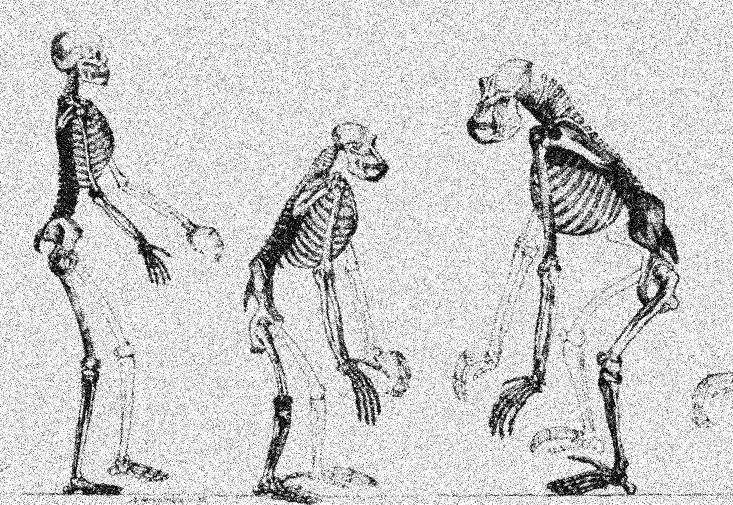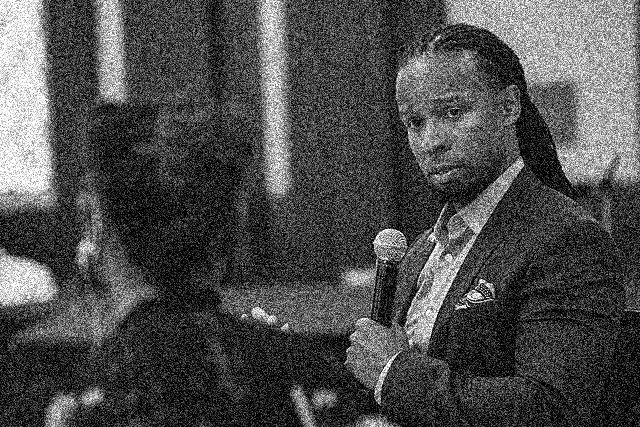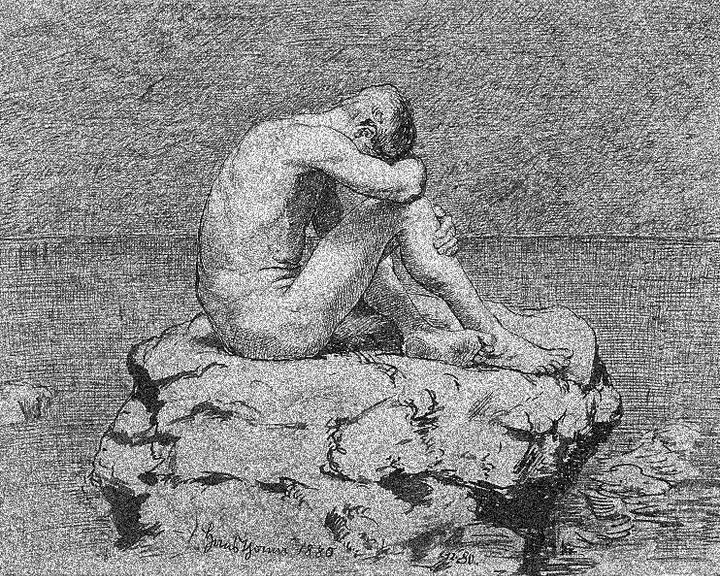Not in Our Genes: Identity Politics as Liberal Ideology
Liberals increasingly want to portray the identitarian and partisan divides as natural, quasi-biological ones. The result is not simply gross misunderstanding of the present political impasse; it’s also surrender to the conditions that perpetuate it.

Recent years have seen the publication of a small library’s worth of popular scholarly accounts written by liberal academics and journalists on the contemporary identity politics craze and its attendant partisan hostilities. Taken together, these books offer a complementary, largely overlapping explanation of these phenomena. Liberals and conservatives, it turns out, are not simply people with different political views; rather, they are fundamentally, even innately, different kinds of people.
In this liberal telling, the antagonistic worldviews of people on opposite sides of the political spectrum reflect their divergent “personality traits” and “psychological dispositions,” especially their perceptions of and responses to threats and uncertainty. Those who believe the world to be more dangerous, express greater wariness of the unfamiliar, and place higher value on cognitive closure are conceptualized as “fixed” or “closed” (or, less charitably, “authoritarian”). Those who perceive the world as less dangerous, who seek out unfamiliar and novel experiences, and who are more comfortable with ambiguity are labeled “fluid” or “open.” Today’s Republican and Democratic parties are sorted by these respective personality types, a phenomenon that has emerged over the last three decades and fueled the ascendance of a particularly contentious “worldview politics” defined by “political mega-identities.”
This political divide has also congealed into distinct patterns of migration, settlement, education, occupation, religion, leisure, and mass consumption. This, we are told, is a decidedly cultural phenomenon, as “citizens form partisan attachments on the basis of cultural affinities rooted in dispositional openness,” as the authors of Open versus Closed: Personality, Identity, and the Politics of Redistribution write. To the extent that matters of economic policy or material concerns play into these dynamics, they do so as dependent, not independent, variables, with citizens simply “tak[ing] cues from partisan elites on technical issues related to taxes, spending, and government regulation of the economy.”
Liberal thinkers increasingly attribute these worldview-cum-cultural-cum-identity-cum-political differences to human biology. In Open versus Closed, for example, readers are informed that there is “increasing evidence that personality and political orientation are in part heritable.” “Democrats’ and Republicans’ bodies and minds appear to be different,” affirm the authors of Prius or Pickup? How the Answers to Four Simple Questions Explain America’s Great Divide, meaning that divergent political views are actually “wired in people’s physiology, and expressed in their reflexes and in other unconscious ways.” Predisposed: Liberals, Conservatives, and the Biology of Political Differences offers a book-length treatment of these topics, which the authors summarize as follows:
It turns out that liberals and conservatives… have different neural architecture and display distinct brain waves in certain circumstances; they have different personalities and psychological tendencies; they differ in what their autonomic nervous systems are attuned to; they are aroused and pay attention to different stimuli; and they might even be different genetically. At least at the far ends of the ideological spectrum, liberals and conservatives are emotionally, preferentially, psychologically, and biologically distinct.
Political partisanship on a collective level, we are told, is also a biological phenomenon—a modern manifestation of human beings’ “tribal” nature and “primordial group passions,” as Amy Chua describes in Political Tribes: Group Instinct and the Fate of Nations. Chua and others invoke evolutionary science to explain these dynamics, casting twenty-first century partisanship as a modern iteration of Darwinian tribalism and an ontological feature of humanity. As prehistoric hunter-gatherers, “to be a part of a group, and to see that group thrive, meant survival,” writes Ezra Klein in Why We’re Polarized. “To be exiled from a group, or to see your group crushed by its enemies, could mean death.” These group dynamics are conceived of in terms of “identities,” with race, ethnicity, and religion considered among the most “primal.” The authors of Identity Crisis: The 2016 Presidential Election and the Battle for the Meaning of America describe these identities as “cleavages” whose ontological primacy can be “activated” at any time by demagogues and propagandists in service of controlling the thoughts, feelings, and behavior of the masses.
In these accounts, the actual substance of politics is thought to be largely, if not entirely, irrelevant to these tribal dynamics. Indeed, in the group context, not only are bread-and-butter issues related to people’s material well-being deemed trivial, even the “culture wars” are reduced to proxies for identitarian jockeying. “Viscerally and emotionally,” Klein explains, “the stakes of politics we have evolved to sense is whether our group is winning or losing, whether the out-group is gaining the power to threaten us or whether our allies are amassing the strength to ensure our safety and prosperity.” Seemingly unambiguous matters of resources and material security are not actually about those things, but are, “in fact, a thymotic desire for recognition of one’s dignity and status,” as Francis Fukuyama writes in Identity: The Demand for Dignity and the Politics of Resentment. Modern political partisanship, in other words, is not actually driven by the prospect of shaping public institutions in accordance with a particular political vision, but rather about the validation of one’s identity and the satisfaction derived from seeing the “other side” lose.
There are some pretty basic problems with these arguments and the general analytic narrative into which they cohere. The research on “biological politics” is overwhelmingly speculative, and correlation and causation are routinely conflated in this and other lines of argumentation throughout these works. Notions of identity politics as Darwinian tribalism clash with the attendant argument that politics is decidedly not about material resources and security. “Identity” is invoked in imprecise and contradictory ways, leaving the impression that it operates as a mystical and ubiquitous force capable of dictating human behavior and the broader course of history. (“Social identities have a special power to affect behavior” via their generation of “automatic and primal feelings,” insists Lilliana Mason in Uncivil Agreement: How Politics Became Our Identity.) Questions of how and why (a) people’s politics shift over time, (b) political movements develop and come apart, and (c) the commitments of political parties are determined and/or change are not only left unasked and unanswered but are effectively barred from consideration.
What is perhaps more interesting and revealing than the shortcomings of these arguments, however, is their latent function: to read identity politics into nature. As such, this account of identity politics and attendant partisan polarization is deeply ideological, offering an explanation of the status quo as the natural order of things. Such an account is incredibly helpful if, like the ruling class and their political proxies, you benefit from and enjoy the status quo. It effectively tells us: “Political organizing on the basis of anything other than ‘identity’ is not only misguided—it goes against nature. People are concerned not about their material well-being but about ‘culture wars’ and partisan tribalism. Politics function simply as a forum for self-expression and identitarian affirmation.”
In this telling, historical social and political movements, both domestic and global, are emptied of their substance and reduced to or reinterpreted in terms of their identitarian elements. The postwar civil rights movement was not a series of campaigns for specific transformations to the social, economic, and political order, but simply a fight for a generic “racial justice”; the Viet Cong, Afghani communists, and Venezuelan Chavistas were not animated by class struggle, but by ethno-racial affinities; the French Revolution and all subsequent rebellions across the globe have been simply “demands for recognition,” whatever that is supposed to mean. (It goes without saying that reframing bread riots as an appeal to respect the “identities” of starving peasants requires a truly remarkable level of ideological commitment.)
While many of these authors would have us believe in the transhistorical nature of this apparent identitarian ontology, the trend toward worldview politics, partisan sorting, and political polarization have clear roots in the political shifts of the neoliberal period. Indeed, despite their ontological trappings, these accounts typically locate the emergence of these dynamics only within the last three decades—in other words, during the exact period in which broad bipartisan consensus emerged on the major economic questions shaping people’s lives: welfare state retrenchment, trade policies that have gutted the working class, monetary policy designed to prevent full employment and depress wages, a battered and abandoned labor movement, and the like. Other, parallel developments have similarly aided and abetted the identitarian turn, particularly the disappearance of unionized employment, the decline of other mass-membership organizations, and the rise of a fragmented, foundation-funded nonprofit sector. These realities necessarily reduce politics to a forum in which identity, symbolism, and stopping comparatively worse things from happening (i.e., “beating the other side”) take on outsized importance. Indeed, it is revealing that many of the measures used in the various surveys and experiments described in these books to indicate “liberal” economic positions—single-payer healthcare, a federal jobs guarantee—are unrecognizable as priorities of the Democratic Party.
Yet none of this was “natural” or inevitable; it is not a reflection of innate human biology or Darwinian tribalism. Rather, contemporary identity politics and partisan polarization are the consequences of the fact that politics has been largely stripped of its instrumental ends, particularly with regard to improving life for working people, and the vehicles for pursuing those ends have been hollowed out. Indeed, these phenomena only truly congealed at the “end of history”—that is, only once the collapse of the Soviet Union and triumph of market economies on the global stage and the Democratic Party’s utter betrayal of New Dealism on the domestic front signaled that the possibility for class-based struggle had been effectively foreclosed. By presenting identities, worldviews, and politics as matters of ontology, however, these phenomena are cast as all-encompassing explanations for both people’s behaviors and for the social order itself, as opposed to products of the social order and phenomena that themselves require explanation.
Sociologist Rogers Brubaker and historian Frederick Cooper made the case two decades ago that “we should seek to explain the processes and mechanisms through which what has been called the ‘political fiction’ of the ‘nation’—or of the ‘ethnic group,’ ‘race,’ or other putative ‘identity’—can crystallize, at certain moments, as a powerful, compelling reality. But,” they warned, “we should avoid unintentionally reproducing or reinforcing such reification by uncritically adopting categories of practice”—that is, folk notions that people employ to make sense of their daily lives—“as categories of analysis.” In this sense, the entire liberal account of identity politics might be read as an exercise in precisely such reification—an elaborate framework designed to render identity politics, partisan polarization, and the social order they reflect as an extension of human nature.
This is the work of committed, if perhaps unwitting, ideologues. We should recognize it as such, and struggle fiercely against its propagation and the social order it is designed to rationalize. Indeed, by their own admission, most of these thinkers have little to no idea how we might resolve today’s polarized, gridlocked politics, much less how to address the intensifying inequality crushing broadening segments of American society. And this is as it must be, since to do so requires a politics not of a different identity, but of a different order.
■
Roberto R. Aspholm is an assistant professor of social work at the University of St. Thomas.



